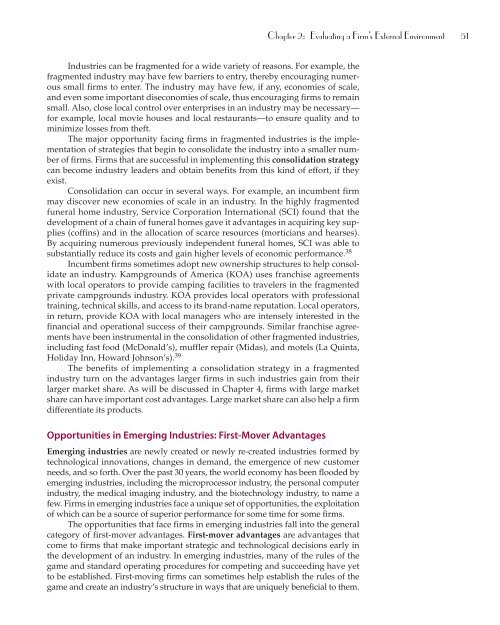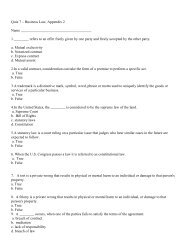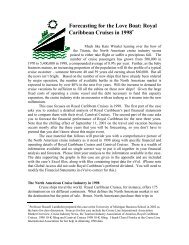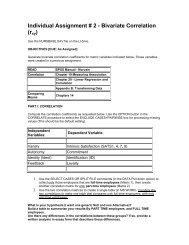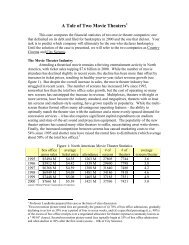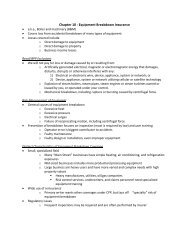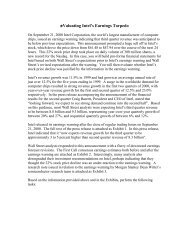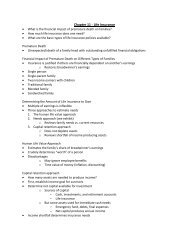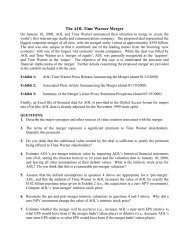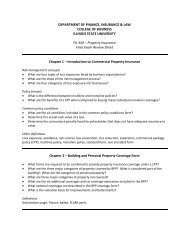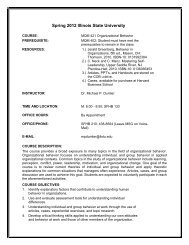Evaluating a Firm's External Environment - Illinois State University
Evaluating a Firm's External Environment - Illinois State University
Evaluating a Firm's External Environment - Illinois State University
Create successful ePaper yourself
Turn your PDF publications into a flip-book with our unique Google optimized e-Paper software.
M02_BARN4586_03_SE_C02.qxd 7/1/09 7:34 AM Page 51<br />
Chapter 2: <strong>Evaluating</strong> a Firm’s <strong>External</strong> <strong>Environment</strong> 51<br />
Industries can be fragmented for a wide variety of reasons. For example, the<br />
fragmented industry may have few barriers to entry, thereby encouraging numerous<br />
small firms to enter. The industry may have few, if any, economies of scale,<br />
and even some important diseconomies of scale, thus encouraging firms to remain<br />
small. Also, close local control over enterprises in an industry may be necessary—<br />
for example, local movie houses and local restaurants—to ensure quality and to<br />
minimize losses from theft.<br />
The major opportunity facing firms in fragmented industries is the implementation<br />
of strategies that begin to consolidate the industry into a smaller number<br />
of firms. Firms that are successful in implementing this consolidation strategy<br />
can become industry leaders and obtain benefits from this kind of effort, if they<br />
exist.<br />
Consolidation can occur in several ways. For example, an incumbent firm<br />
may discover new economies of scale in an industry. In the highly fragmented<br />
funeral home industry, Service Corporation International (SCI) found that the<br />
development of a chain of funeral homes gave it advantages in acquiring key supplies<br />
(coffins) and in the allocation of scarce resources (morticians and hearses).<br />
By acquiring numerous previously independent funeral homes, SCI was able to<br />
substantially reduce its costs and gain higher levels of economic performance. 38<br />
Incumbent firms sometimes adopt new ownership structures to help consolidate<br />
an industry. Kampgrounds of America (KOA) uses franchise agreements<br />
with local operators to provide camping facilities to travelers in the fragmented<br />
private campgrounds industry. KOA provides local operators with professional<br />
training, technical skills, and access to its brand-name reputation. Local operators,<br />
in return, provide KOA with local managers who are intensely interested in the<br />
financial and operational success of their campgrounds. Similar franchise agreements<br />
have been instrumental in the consolidation of other fragmented industries,<br />
including fast food (McDonald’s), muffler repair (Midas), and motels (La Quinta,<br />
Holiday Inn, Howard Johnson’s). 39<br />
The benefits of implementing a consolidation strategy in a fragmented<br />
industry turn on the advantages larger firms in such industries gain from their<br />
larger market share. As will be discussed in Chapter 4, firms with large market<br />
share can have important cost advantages. Large market share can also help a firm<br />
differentiate its products.<br />
Opportunities in Emerging Industries: First-Mover Advantages<br />
Emerging industries are newly created or newly re-created industries formed by<br />
technological innovations, changes in demand, the emergence of new customer<br />
needs, and so forth. Over the past 30 years, the world economy has been flooded by<br />
emerging industries, including the microprocessor industry, the personal computer<br />
industry, the medical imaging industry, and the biotechnology industry, to name a<br />
few. Firms in emerging industries face a unique set of opportunities, the exploitation<br />
of which can be a source of superior performance for some time for some firms.<br />
The opportunities that face firms in emerging industries fall into the general<br />
category of first-mover advantages. First-mover advantages are advantages that<br />
come to firms that make important strategic and technological decisions early in<br />
the development of an industry. In emerging industries, many of the rules of the<br />
game and standard operating procedures for competing and succeeding have yet<br />
to be established. First-moving firms can sometimes help establish the rules of the<br />
game and create an industry’s structure in ways that are uniquely beneficial to them.


